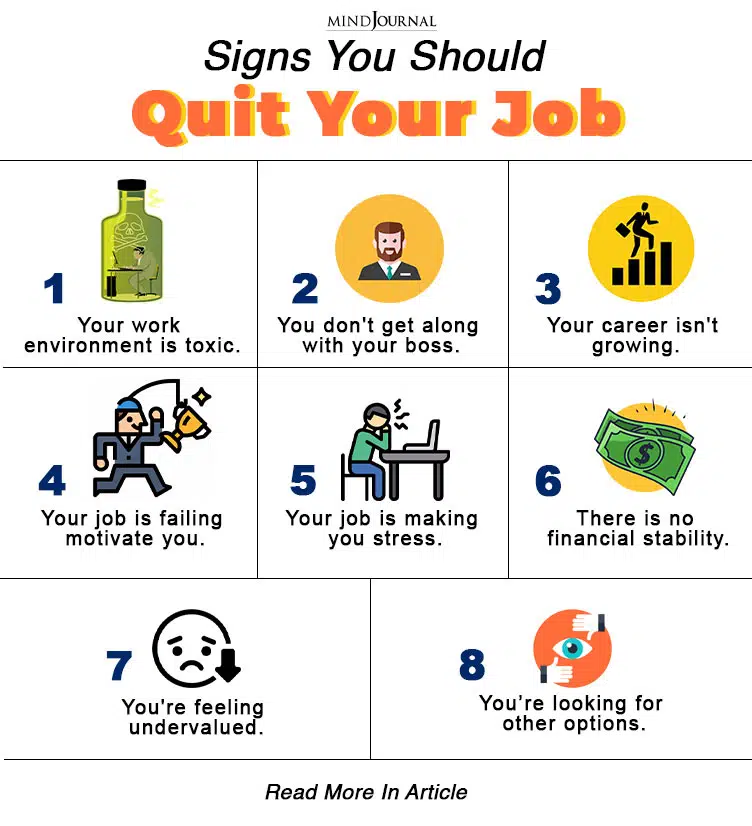Society preaches to ‘follow your dreams,’ but when it comes to the working world, that can be inevitably difficult. As ideal as it would be to have the perfect job, anyone who’s carried a nine-to-five knows that you’re inevitably going to be frustrated by your current career—regardless of how many benefits, perks, and good moments there are.
Work can be difficult, there’s no question about that. From dealing with arrogant bosses to having an overwhelming workload or low pay, there is a myriad of reasons to want to quit your job.
But beyond the day-to-day frustrations, if this is something you’re seriously considering, you’ll need to determine whether this is a smart, or spur-of-the-moment decision. But beyond the day-to-day frustrations, if this is something you’re seriously considering, you’ll need to determine whether this is a smart, or spur-of-the-moment decision.
In a recent study, 62% of people surveyed said that they would increase their job search efforts in 2019. If you feel that this statistic relates to you, or you’ve been seriously thinking about leaving in pursuit of something better, here are some legitimate reasons to quit your job.

1. You’re in a hostile or biased environment.
If your workplace isn’t welcoming or creates an environment of fear, unhealthy competition, or any racism, sexism, ageism, etc. you have every right to walk out. The workplace should never be a place where you feel unwelcome, unwanted, or unsafe.
That being said, the first step is to communicate these issues and frustrations with a boss/higher up, or the HR team before simply quitting. If you’ve expressed concerns, talked to the right people, and attempted to fix some of the biases and other problems with no result, then it’s time to seriously consider something else.
2. You and your boss don’t see eye-to-eye.
You’re not always going to get along with your boss. There will be times, especially if you’re a strong-minded or creative person when your ideas won’t match and some insight you bring to the table may not be agreed upon.
Walking out at the first disagreement is silly, but if you find yourself in constant arguments with your boss, unable to express yourself, your ideas, or your concerns, it might be time to quit your job. You don’t (and won’t!) always get along, but things shouldn’t constantly be tense and at odds, either.
3. Your career trajectory is not promising.
Your career trajectory is probably one of the most important components of your current job. Your job is supposed to be beneficial for your overall development as an individual. When you start a new position, there should be ample opportunities to grow and climb the proverbial ladder to success.
If you’re realizing that there’s no upward direction, no promotional opportunities, or no increase in pay, it might be a good time to start looking elsewhere.
4. You’re losing interest and feeling unmotivated and ‘stuck.’
An ideal job is one that motivates and encourages you. While you won’t always feel at the top of your game, the right career will be challenging, difficult, and simultaneously stimulating in nature.
If the job is not providing you with new achievable and creative challenges, you are bound to feel stuck. And when you feel stuck, your productivity will significantly decrease. This ends up affecting your self-esteem as well as your work ethic.
Read Burnout Prevention and Treatment Strategies How To Deal with Overwhelming Stress
5. Your job is adding a considerable amount of unneeded stress.
Beyond the stress of deadlines, decisions, confrontations, and negotiations, if your job is making you stress constantly about your next steps, your financial status, or how you’re going to get through the remainder of the week, it might be time to quit your job.
Job-related stress should be left at the office. If it stays with you or spreads into your personal life, it’s time to take note. Your job shouldn’t overshadow your entire life.
Read How To Find A Purpose in Life and Give Your Life Meaning?
6. You’re not financially where you’d like to be.
Money isn’t everything, of course, but it’s a huge part of why you’re working and where you’re working. If you find that your current job isn’t offering you what you believe you deserve, it’s time to have a conversation. It’s also time to think about what your career trajectory looks like (see point 3) and what you feel your next step is.
If you’ve had conversations and found yourself stuck in a financial rut with no promise for an increase in the future, it might be time to quit your job and look for a better-paying opportunity.
7. You’ve communicated, on some level, your frustrations.
Another important aspect of your job is your job environment – whether it’s safe, secure, hygienic, conducive to productivity, etc.
If you’ve expressed your concerns with coworkers, boss(es), higher-ups, etc. and haven’t received a response or the response you’re looking for, or if you feel that you’ve said and done everything you can to stay but still aren’t happy, it’s probably time to part ways.
8. You’ve wanted to quit your job for a while, and have even gone so far as to pursue other options.
If you’ve been searching and pursuing other options, this is a major sign you should quit your job. You can talk the talk all you want, but once you start walking the walk, and actively pursuing other positions, it’s true that you aren’t happy with where you are.
When one door is closed, don’t you know that many more are open? – Bob Marley
If you believe you are capable of doing better and deserve overall better opportunities, you may have to quit your job. And that’s okay.
The opportunities, although daunting at first, are endless.










Leave a Reply
You must be logged in to post a comment.